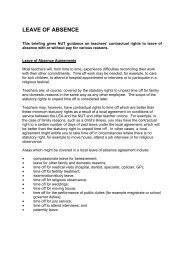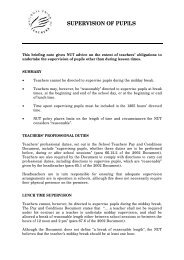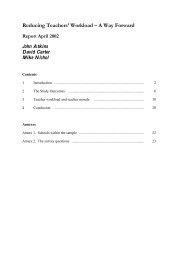You also want an ePaper? Increase the reach of your titles
YUMPU automatically turns print PDFs into web optimized ePapers that Google loves.
One less thing to worry about…What’s covered by yourhome insurance…Don’t wait until it’s toolate to find out thatyour home insurancedoesn’t cover what youthought it did – getcomprehensive cover,designed for teachers,with a special discountfor NUT members.To find out more call us FREE on0800 37 87 22 or visit our website atwww.teachersassurance.co.uk/HN052We would like to make you aware that calls may be monitored and recorded. The <strong>National</strong> <strong>Union</strong> <strong>of</strong> <strong>Teachers</strong> is an introducer appointed representative <strong>of</strong> <strong>Teachers</strong> Assurance. <strong>Teachers</strong> Assuranceis a trading name <strong>of</strong> <strong>Teachers</strong> Provident Society Limited. <strong>Teachers</strong> Home Insurance is provided by <strong>Teachers</strong> Assurance Company Limited, which is authorised and regulated by the Financial ServicesAuthority (FSA), entered on the FSA register no. 202569. Registered Office: Tringham House, Deansleigh Road, Bournemouth, BH7 7DT815912
3Qualifying toteach in 2012?Get four termsfull membershipfor just£1Phone or go online to upgrade from student to full membership<strong>of</strong> the NUT, even before you qualify.Membership hotlines:0845 300 1669/020 7380 6369Monday-Friday (9am-5pm)or go online at www.teachers.org.uk
4Justqualified?Congratulations!You’ve completed your teacher training course.Now we’ve got two training and pr<strong>of</strong>essional developmentopportunities especially for you that are too good to miss...Just Qualified Summer WorkshopMonday 23 July to Wednesday 25 July 2012A three day course at the NUT’s national training centre,Stoke Rochford Hall, a superb Victorian mansion.Meet other just qualified teachers from England and Wales.At the workshop you will find out:• some strategies for that important first year <strong>of</strong> teaching;• about your conditions <strong>of</strong> service;• how to get the best out <strong>of</strong> your first year as a teacher; and• about the support, benefits and services on <strong>of</strong>fer from the NUT.The summer workshop is FREE and open to all NUT members qualifying in 2012.The NUT reimburses your travel expenses and provides your food and accommodation.Apply online at www.teachers.org.uk/training
5Start RightOne-day pr<strong>of</strong>essional development seminars in various locationsacross England and Wales in 2012:London (29 June)Durham (2 July)Manchester (4 July)Nottingham (5 July)Birmingham (5 July)Cambridge (10 July)Southampton (11 July)Bristol (12 July)Cardiff (13 July)Exeter (13 July)London (16 July)At the seminar you will:• promote good behaviour for learning in classrooms;• extend what you learnt during your initialteacher training;• enhance your knowledge <strong>of</strong> tried and testedstrategies for running learning-centred classrooms;• build your confidence for a positive startwith your pupils or students; and• meet other local just qualified teachers.£15 for all teachers – NUT members and others. Travel expenses will be paid.Apply online at www.teachers.org.uk/CPD/startright“Really brilliant to hear lots <strong>of</strong> useful tips and strategiesto try out – sometimes I just don’t know where to start!”
6ContentsContents0708Your20<strong>Teachers</strong> talking• Newly qualified teachers tellus why they joined the NUTWelcome• Welcome from the NUT GeneralSecretary, Christine Blowerfirst year inschool• Anything to declare?• Your first few weeks in school• Visiting your new workplace• Your induction as a newlyqualified teacher• Starting on a fixed-term ortemporary contract• Overseas trained teachers• General Teaching Councils• Tip for surviving your first term
• Fair appraisal andcapability procedures• In defence <strong>of</strong> teachers’pensions and pay• Tackling excessive workload• Send My Friend• Thinking <strong>of</strong> working inan academy?24About the NUT• A Robin Hood Tax• School banding in Wales• Music for Youth• End child poverty• Our aim: one union forall teachers7ContentsThe NUT: your<strong>passport</strong> to teaching• NUT website• ‘The Teacher’ –your NUT magazine• ‘Education Review’ -your NUT journal• Know your union rep• NUT News• Your NUT representative• Your local association• Learning with the NUT• NUT learning representatives• Automatic protection• A voice for young teachers• Benefits and services46•34Money mattersFair Pay For <strong>Teachers</strong>• <strong>Teachers</strong>’ salaries• Main pay scale• Additional allowances• Salary scales for Londonand the Fringe Area• Your starting salary• Salary queries• Your student loan• Help with home buying• Pensions: don’t opt out!• <strong>National</strong> Insurance
8Contents56The NUT: making a difference• Complete protection• Teaching in Wales –Dysgu yng Nghymru• Funding in Wales –Cyllido yng Nghymru• <strong>Teachers</strong>’ conditions <strong>of</strong> service• <strong>Teachers</strong>’ working time• Pr<strong>of</strong>essional duties• Mobile matters• Be cyber-safe• <strong>Teachers</strong>’ legal responsibilities• Managing pupil behaviour• <strong>Teachers</strong>’ sick pay• Maternity rights• Leave <strong>of</strong> absence• Parental leave• Trade union dutiesand activities• Notice to leave your job• Cover for absent colleagues• Gained time• Performance management• Accidents in school• Grievance anddisciplinary proceduresWays <strong>of</strong> working• Contracts• Part-time teaching• Supply teaching• Teacher employmentagencies• Self employment• Independent schools• Sixth form colleges72•• AcademiesFree schoolsContact us, usefulwebsites and addresses78
9WelcomeWelcomeWelcome to Your Passport to Teaching, the NUT’s essential guidefor new teachers. It will give you lots <strong>of</strong> advice and guidance, to helpyou as you enter the pr<strong>of</strong>ession.As a student member <strong>of</strong> the NUT, you can become a full member <strong>of</strong> the <strong>Union</strong> by upgrading yourmembership even before you qualify. Phone our membership hotlines on 0845 300 1669 /020 7380 6369 or go to www.teachers.org.ukAs you begin your teaching career we know that money may be tight. That’s why we want yourNUT membership to be affordable.Upgrade from student to full membership <strong>of</strong> the NUT and get four terms membership for just £1.Pay nothing in 2012 and just £1 in 2013. Your next subscription will not be due until February 2014when you will pay only half the full subscription rate.The NUT is the union that only recruits qualified and qualifying teachers. We stand up for teachers’pr<strong>of</strong>essional status and we campaign for a qualified teacher in every classroom. We’re proud tocampaign on the issues that matter to teachers and children.Join the NUT and you will have access to unparalleled legal andpr<strong>of</strong>essional support, including solicitors in every regional <strong>of</strong>ficein England and NUT Cymru in Wales.We would like to welcome you into full NUT membershipand wish you every success in your career.With best wishesYours sincerelyChristine BlowerNUT General Secretary
firstYouryearinschoolYour Passport to Teaching will give you lots <strong>of</strong> adviceand guidance, to help you at the start <strong>of</strong> your career.
12Your first year in schoolYour first few weeks in schoolThere are some specific items <strong>of</strong> information which should beavailable to you as a newly appointed teacher. Depending onhow your school is organised, these may include:• a staff handbook, including plans ormaps <strong>of</strong> the school, staff lists, includingroles and responsibilities, and informationabout governors;• a guide to the resources available;• copies <strong>of</strong> policies affecting the pastoral work<strong>of</strong> the school, for example codes <strong>of</strong> conducton pupil behaviour and discipline, equalopportunities, bullying and harassment,special educational needs, homework;• copies <strong>of</strong> subject specific policies directlyrelevant to new teachers;• timetable details;• class lists;• a copy or a summary <strong>of</strong> any recentinspection report;• the school development plan or a summary<strong>of</strong> this;• a copy <strong>of</strong> the school’s salary policy;• details about induction arrangements andinformation about who will be your mentor orsupport when you begin to teach in the school.
13Visiting yournew workplaceIdeally, you should have at least one opportunityto visit your new workplace followingappointment and prior to the start <strong>of</strong> yourfirst term.Such visits can be extremely useful, not least inthat they help to break the ice. They can alsoprovide valuable opportunities to meet withprospective colleagues, pupils, and, in somecases, governors and parents. If you have notalready been invited to visit, contact your newschool and ask when would be convenient foryou to do so.As a newly appointed teacher, if you are unsureabout whether certain items <strong>of</strong> information areavailable, take the opportunity on your visit toask for any <strong>of</strong> the items listed above. If they areavailable, the school should be able to provideyou with copies.Anything todeclare?When you apply for a teaching post, you maybe asked to declare any criminal convictionsyou have. The Rehabilitation <strong>of</strong> Offenders Actdoes not apply to teachers or those applying forteaching posts. The NUT advises you to fill in thissection <strong>of</strong> the application form truthfully and toinclude any juvenile or adult convictions. If youare asked to provide details <strong>of</strong> any caution orbind over, similarly, you must answer truthfully.Failure to answer the questions truthfully, orgiving false or misleading information, mayhave serious consequences such as summarydismissal or a criminal charge.You will be asked to apply for an ‘enhanced’disclosure from the Criminal Records Bureau(CRB). This provides your employer with details<strong>of</strong> convictions and any information that the policehave disclosed about you.The previous Labour Government put plans inplace that would have required NQTs to registerwith the Independent Safeguarding Authority(ISA) from July 2010. The plans were halted,however, when the Coalition Governmentcame into power.Your first year in school
14Your first year in schoolNow, the Government has repealed legislationrequiring teachers to register with the ISA.Instead, the CRB and the ISA will mergeto combine the criminal records disclosureresponsibilities <strong>of</strong> the CRB with an independentbarring function which is currently theresponsibility <strong>of</strong> the ISA. The barring functionexists to prevent those on what was formerlyreferred to as ‘List 99’ from seeking to workwith children and vulnerable adults.When you are <strong>of</strong>fered a job, you may alsobe asked to disclose any condition whichmay affect your fitness to teach. The NUTrecommends that you disclose any mentalor physical impairment which may affectyour ability to teach. This is for two reasons.First, disclosure will ensure that youremployer has knowledge <strong>of</strong> your condition,which is important in establishing certainlegal protections. Second, disclosure will helpensure that reasonable adjustments are madeto your workplace, where appropriate.
David Fulton BooksHelping You DeliverTeaching Success...• Core books to support Newly Qualified <strong>Teachers</strong>• Packed with practical examples and case studies• Pr<strong>of</strong>essional guidance from experts and teachers• Classroom resources to help you teach• Latest research and education policiescomprehensively covered...For LessWhat if it Happens in My Classroom?Developing Skills for Expert Behaviour ManagementJune 2012: Pb: 978-0-415-68714-0: £18.99 • Members’ Price: £15.00COMING SOONThe Primary English EncyclopediaThe Heart <strong>of</strong> the CurriculumDecember 2011: Pb: 978-0-415-58952-9: £29.99 • Members’ Price: £24.00Visible Learning for <strong>Teachers</strong>Maximizing Impact on Learning4TH EDITIONDecember 2011: Pb: 978-0-415-69015-7: £22.99 • Members’ Price: £18.0020% Discount forNUT Memberson all Routledge Education and DavidFulton Books. Simply use promotionalcode NUT12 when ordering online atwww.routledge.com/teachers.www.routledge.com/teachers
16Your first year in schoolYour induction as a newlyqualified teacherAt the time <strong>of</strong> going to press, the Departmentfor Education and the Welsh Government arecarrying out consultations on changes to NQTinduction regulations in England and Wales.I have QTS. What next?You have been awarded qualified teacherstatus (QTS). Now you are required tocomplete an induction programme and tomeet induction standards.Where can I complete myinduction period?Induction must be provided for newly qualifiedteachers (NQTs) appointed to teaching postsin maintained:• nursery schools;• primary schools;• secondary schools; and• in non-maintained or maintainedspecialist schools.Induction can be served ifcertain criteria are met in:• further education institutions, includingsixth form colleges;• independent schools; and• an early years setting.Induction cannot be served in:• early years centres that are not legallydesignated as schools;• pupil referral units;• secure training centres;• community or foundation special schools ina hospital; or• any school deemed to be in need <strong>of</strong> ‘specialmeasures,’ unless it has been certified in writingby Her Majesty’s Inspectorate (HMI) that theschool is able to provide induction or youpreviously undertook employment-based initialteacher training (ITT) at the same school.Is there a time limit tostarting induction?In England there is no requirement to startinduction within a certain time after completion<strong>of</strong> ITT or to complete induction, once started,within a certain period <strong>of</strong> time.In Wales, there is no requirement to startinduction within a certain time after completion<strong>of</strong> ITT. However, there is an expectation thatinduction will be completed within five years <strong>of</strong>gaining QTS. If you do not complete the inductionwithin 5 years <strong>of</strong> gaining QTS, there may becircumstances in which you can apply foran extension.
Can I work part-time or on aperipatetic basis and stillcomplete induction?Any appointment that lasts for a term or morewill count towards the induction period. Twoconsecutive half-terms (disregarding holidays)will also count towards induction. If you areemployed as an NQT on a part-time basis lastingmore than one term, for example, for one day aweek in a school, this will count on a pro rata basis.Can I work as a supply teacher?If you are working as a supply teacher, you cannotcount periods <strong>of</strong> less than one term in a particularschool towards your induction period.There is a time limit to the amount <strong>of</strong> short-termsupply teaching that you can undertake withouthaving completed induction.Supply in EnglandIn England, you are entitled to work on ashort-term supply placement for up to16 months from the date <strong>of</strong> your first supplyplacement without having to serve an inductionperiod. You will not lose QTS after this 16 monthlimit but you cannot continue to work onshort-term non-inductable placements.Supply in WalesAs an NUT member youwill receive further andup to date guidance oninduction from the <strong>Union</strong>in the summer andautumn terms 2012.In Wales, you are eligible to work as a short-termsupply teacher for a maximum <strong>of</strong> five years fromthe date you gained QTS. This is to allow yousufficient time to secure a suitable post in whichto undertake your induction period.What happens if I have notpassed the skills tests?In England, but not in Wales, teacher trainees arerequired to pass literacy, numeracy and ICT skillstests in order to gain QTS.If you trained in England, until you have passed all<strong>of</strong> the skills tests and gained qualified teacherstatus, you cannot begin your induction period ineither England or Wales.QTS gained in Wales enables you to teach in bothEngland and Wales.17Your first year in school
18Your first year in schoolStarting ona fixed-termor temporarycontractThe NUT believes all employers should employnewly qualified teachers on permanent rather thantemporary or fixed-term contracts. A permanentcontract is in the best interests <strong>of</strong> the newlyqualified teacher and also in the long-terminterest <strong>of</strong> schools.Overseastrained teachers<strong>Teachers</strong> trained outside the UK are permitted toteach in maintained schools and non-maintainedspecial schools as unqualified teachers for nomore than four years. In Wales, this is limited totwo years. Time begins to run from the date onwhich the teacher first teaches in a school inEngland or Wales and does not stop when theteacher takes a break from teaching, other thana break for statutory maternity, paternity,adoption or parental leave.The Government is consulting on proposals toallow fully qualified teachers from the US,Canada, New Zealand and Australia to teachin schools as qualified teachers. If the proposalsgo ahead from April 2012 teachers from thesecountries could be entitled to the same payscale, promotional and CPD opportunities asteachers qualifying in England. They may also notbe required to complete any period <strong>of</strong> induction.For teachers from other countries the regulationsremain the same.The NUT’s advice to overseas trained teachers isto seek to obtain Qualified Teacher Status (QTS)as soon as possible on arriving in the UK.
19GeneralTeachingCouncilsGeneral Teaching CouncilEngland (GTCE)At the time <strong>of</strong> going to press, the requirementsrelating to the registration <strong>of</strong> qualified teachersin England remain unclear. The GTCE is set toclose on 31 March 2012. Until legislation hasbeen enacted, registration with the GTCEremains a legal requirement for qualified teachersemployed in maintained schools. Newly qualifiedteachers should seek advice from the GTCE onthe requirements relating to registration whenthey have been <strong>of</strong>fered, and accepted, their firstteaching post in a relevant school.GTC England: www.gtce.org.ukTel: 0370 001 0308Email: registration@gtce.org.ukGeneral Teaching CouncilWales (GTCW)To teach in maintained schools andnon-maintained special schools in Wales as aqualified teacher, you must be registered withthe GTC Wales.GTC Wales: www.gtcw.org.ukTel: 029 2046 0099Email: registration@gtcw.org.ukTip for survivingyour first termLook after your voicePitch your voice within its comfortable rangeand avoid shouting to get attention. Furtherinformation is set out in the NUT’s voice careguidance, available from the NUT website at:www.teachers.org.uk/voicecareVoice Care Network UKis a charity set up by voiceteachers and speech therapiststo support teachers and otherpr<strong>of</strong>essional groups.www.voicecare.org.ukYour first year in school
TheNUTforqualifiedandqualifyingteachersWe’re the union that recruits only qualified teachers,or those who are on courses or in posts that will leadto teacher qualification.We firmly believe that every class should have aqualified teacher.www.teachers.org.uk
21 21Notes21
<strong>Teachers</strong>talkingNewly Qualified <strong>Teachers</strong> tell uswhy they joined the NUT.
24<strong>Teachers</strong> talkingKerronda BuchananI joined the NUT:• to have the security <strong>of</strong> advice andrepresentation, were any incident to arisethat could leave me vulnerable• to have access to training opportunitiesStephanie ChristieThe NUT was recommended by manyexperienced teachers within schools in myarea as the largest teachers’ union with anoutstanding reputation.The NUT has lots to <strong>of</strong>fer members, includingan immense amount <strong>of</strong> support throughoutteachers’ careers.Dylan ScottThe NUT has a reputation <strong>of</strong> fighting for anddefending rights.Rob ClarkeI wanted the security <strong>of</strong> knowing that someonewould be there to fight my corner if I was everfalsely accused by a pupil.It’s very difficult to fight battles on your own.Helen CookI joined the NUT because it is the union forqualified and qualifying teachers only. So allmembers and representatives helping andadvising me would be experts in education.Gemma LeeThe NUT provided influential and positiveguidance as well as support during my first year<strong>of</strong> teaching. It also <strong>of</strong>fered protection allowing anelement <strong>of</strong> security during a turbulent year.
25“I joined the NUTto feel secure inthe knowledge thatmy views would belistened to and to feelable to have impartialadvice available if andwhen I may need it.”<strong>Teachers</strong> talkingMatthew Todd
AbouttheNUT<strong>Teachers</strong> tell us that they want their union to promote teachingas a respected pr<strong>of</strong>ession, to stand up for teachers and forthose they teach. As you join the teaching pr<strong>of</strong>ession, you needa strong campaigning union, the NUT.
28About the NUTFair appraisaland capabilityproceduresThe NUT believes in fair appraisal and capabilityprocedures for teachers and is, therefore,opposed to the punitive new arrangementswhich the Government is seeking to introducefrom September 2012. <strong>Teachers</strong> should feelable to talk honestly about their pr<strong>of</strong>essionaldevelopment within a supportive appraisalprocess. As part <strong>of</strong> a new, Governmentpromotedmodel policy, appraisal, which shouldbe a positive developmental process andcapability, which has dismissal as the ultimatesanction, will form part <strong>of</strong> the same procedure –a linkage which we believe to be fundamentallyflawed. The Government is also removingthe statutory limit on lesson observations forappraisal purposes.The NUT is campaigning to maintain fairprocedures in all schools, including limits onobservations. The Government’s model policy isnot compulsory and where teachers are happywith current arrangements in their school, thereshould be no need for any change.In defence<strong>of</strong> teachers’pensions and payThe NUT is at the forefront<strong>of</strong> the campaign to protectteachers’ pensionsIt is unacceptable for teachers to be expected towork a lot longer and pay a lot more to receive alot less in retirement.<strong>Teachers</strong> at the start <strong>of</strong> their careers will beparticularly badly affected by the Government’sproposed pension changes.Find out how much you stand to lose withthe NUT’s pensions loss calculator at:www.teachers.org.uk/pensionsMost NQTs will start on point M1, so enter thatpay point when you use the calculator, unlessyou have been <strong>of</strong>fered a job with a higherstarting salary.Freezing the pay <strong>of</strong> teachers and other publicsector workers is similarly unfair and makes itharder for you at the start <strong>of</strong> your career. It isunfair for teachers entering the pr<strong>of</strong>ession to befaced with working until 68 whilst having theirpay squeezed.
29Tackling excessiveworkloadTackling the excessive workload culture prevalentin so many schools is one <strong>of</strong> the NUT’s prioritiesand is good for children as well as for teachersand their families. Recent Government surveyshave revealed that most teachers work onaverage at least 50 hours a week, leaving littletime for family and leisure activities. Tired andover-worked teachers are less likely to performat their best, potentially compromising theeducational outcomes for their pupils.Particular issues <strong>of</strong> concern to NUT members,highlighted in the NUT’s latest workload survey,include over-burdensome lesson planningrequirements, with some head teachers, forexample, expecting to check all lesson plans,too many meetings, high class sizes, excessivelesson observation and an overall lack <strong>of</strong>work-life balance.You can find more information atwww.teachers.org.uk/workloadSpeak to your NUT school representativeor division/association secretary if you haveconcerns about your workload.Send My FriendThe NUT is a major supporter<strong>of</strong> the Global Campaign forEducation (GCE), a coalition<strong>of</strong> charities and teacher unionswhich organises the Send MyFriend to School campaigneach year.Thanks to the campaigning <strong>of</strong> hundreds <strong>of</strong>thousands <strong>of</strong> teachers and young people, millions<strong>of</strong> primary age children that were previouslydenied access to education now go to school.GCE’s campaign theme this year is ‘Go for Gold’,to tie in with the Olympic Games in London.The campaign narrative tells young people abouta great education race begun in 2000 when worldleaders promised education for all by 2015.It charts the progress to date and notes that muchlike marathon runners, world leaders seem to have‘hit a wall’ with progress stalling <strong>of</strong> late with67 million children still missing out on school.You can find out more about the campaign atwww.sendmyfriend.org Please support thecampaign and help us put pressure on worldleaders to keep their promise to delivereducation for all.About the NUT
30About the NUTThinking <strong>of</strong> workingin an academy?Things to bear in mind…Academies are state funded independentschools. Some are run by sponsors – <strong>of</strong>tenbusiness people or religious organisations –but the latest academies do not have sponsorsand are instead run by an academy trust drawnfrom the governing body. They are outside thelocal authority family <strong>of</strong> schools. They havemore freedom over the curriculum and can settheir own pay, conditions and working timearrangements for newly appointed teachersjoining their staff.NUT concernsThe NUT is firmly committed to supportingthe growing number <strong>of</strong> members who workin academies. However, we remain opposed inprinciple to the academies’ programme because<strong>of</strong> our concerns about:• Academies’ freedom to ignore teachers’national pay and conditions for new joinersto the academy.• Complaints from members already workingin academies about excessive workload,increased working hours, high staff turnoverand bullying management.• The Government is intent on relaxing therequirement for academies to employqualified teachers.• The lack <strong>of</strong> a track record in raising levels<strong>of</strong> attainment for pupils.• The unsuitability <strong>of</strong> many sponsors.• The lack <strong>of</strong> democratic accountability<strong>of</strong> academies.• The adverse impact <strong>of</strong> academies on localauthority services for schools.• Unfair funding and admission arrangements.• The denial <strong>of</strong> trade union negotiating rights insome academies.Whatever the situationregarding union recognition inan academy, teachers are stillentitled to be members <strong>of</strong> theNUT. The NUT can advise youon any problems you encounterat work.An expensive experimentThe NUT opposes the transfer <strong>of</strong> billions <strong>of</strong>pounds worth <strong>of</strong> publicly funded buildings andland to unaccountable academy sponsors oracademy trusts.
31About the NUTYour payThe NUT argues that academies should notoperate outside the system <strong>of</strong> national payand conditions for school teachers. They canset their own levels <strong>of</strong> pay for staff who havenot transferred to the academy. There is norequirement for an academy to implementnational pay awards for new staff, and longercontracted working hours for new starters maymean your hourly pay is less than in a localauthority school.In FE, colleges became independent from localauthorities in the 1990s in a process similar tothe academies process for outstanding schools.Lecturers have seen their pr<strong>of</strong>ession becomecasualised, and their pay levels fall further andfurther behind school teachers.Your employment termsand conditionsAcademies can set their own rules regardingworking duties, days and hours, breaks,holidays, sick leave, maternity/paternity leaveand so on for staff who are new to an academy.In many academies a significant worsening <strong>of</strong>conditions has already been imposed on newstaff. For example:• Absence <strong>of</strong> any limits on working time –The ARK academies chain has nocontractual limit <strong>of</strong> any kind on working timein its academies.• Changes to conditions <strong>of</strong> service - Someacademies, such as those operated by theThomas Telford group require 1,500 hoursor more <strong>of</strong> directed working time. A number<strong>of</strong> academies in some multi-academy chainsuse informal ‘learning walks’ as a means <strong>of</strong>teacher observation.• Pay - The Labour Research Departmentcarried out a survey on pay for senior staff inboth individual stand-alone academies andacademy chains which was published inApril 2011. The LRD found that pay for seniorstaff in academies was outpacing that <strong>of</strong> theircounterparts in local authority maintainedschools. The flexibility academies have on payhas been used to benefit a small number <strong>of</strong>senior staff instead <strong>of</strong> benefiting all employees.For more information on why the NUT remainsopposed in principle to the academiesprogramme go to:www.teachers.org.uk/academies
32About the NUTA RobinHood TaxA Robin Hood Tax would introduce a smalltax on banks, hedge funds and other financialinstitutions and raise billions <strong>of</strong> pounds to invest inpublic services and tackle poverty, both in the UKand abroad.The NUT is a supporter <strong>of</strong> the Robin Hood Taxcampaign. For further information please visitwww.robinhoodtax.org.ukSchool bandingin WalesNUT Wales members are celebrating a majorvictory in securing a postponement to primaryschool banding. This system, which ranksschools on their performance in 5 tier bands,was due to come into effect this year prior toconcerns raised by NUT members. However,despite this success, the campaign doescontinue. Secondary school banding is stillin effect and the Education Minister is stillmaintaining that this system will be broughtin for primary schools by 2014. The NUT willkeep making the case that this league tablestyle system will have a devastating impact onall schools.<strong>Teachers</strong> across Wales are already seeing thedamaging impact <strong>of</strong> this banding system.Our united campaign has had a positive effectbut for it to truly succeed it is important wecontinue to make the case as to why teachers,parents and pupils would be better <strong>of</strong>f in abanding free Wales.For more information go towww.teachers.org.uk/walescampaigns
33Music for Youthwww.mfy.org.ukThe NUT is a major sponsor <strong>of</strong> Music for Youth(MFY), an educational charity with a worldwidereputation for its work in music education.The charity provides free access to educationaland performance opportunities for 100,000young people, aged from 4 to 21 years, througha nationwide series <strong>of</strong> festivals and concerts,culminating in the Schools Prom concerts inNovember at the Royal Albert Hall.Each year, the NUT and MFY run a competition<strong>of</strong>fering schools the chance to win a trip to theSchools Prom and a visit from a MFY MusicMentor to help develop music-making inthe school.For more information about the NUT’s work withMFY, including details <strong>of</strong> this year’s competition,please visit:www.teachers.org.uk/music-for-youthEnd child povertyThe NUT is proud to be a member <strong>of</strong> theEnd Child Poverty campaign. We are:• Speaking up for the one in five children inBritain living in poverty today; and• Reminding all political parties <strong>of</strong> their promiseto eradicate child poverty by 2020.The End Child Poverty campaign has publishedfigures that provide a child poverty map <strong>of</strong> thewhole <strong>of</strong> the UK. The figures are broken downby parliamentary constituency, local authorityand ward and paint a stark picture <strong>of</strong> a sociallysegregated Britain where the life chances <strong>of</strong>millions <strong>of</strong> children are damaged by povertyand inequality.Check out the map atwww.endchildpoverty.org.ukAbout the NUT
Ouraim:oneunionfor allteachersThe NUT believes that aunited teaching pr<strong>of</strong>ession isthe best way to ensure a firstrate education system for allour children.Together we would all bestronger to tackle the mostimportant issues facingteachers such as workload,pay, testing, inspection andclassroom observation.We are proud to be thelargest teachers’ union andalso proud to be the unionconsistently campaigningfor Pr<strong>of</strong>essional Unity.
Notes353535
TheNUT :your<strong>passport</strong>toteachingYour NUT membership entitles you to acomprehensive range <strong>of</strong> benefits and services.
Your guide to academiesMake 4 February <strong>National</strong> Libraries Day!Sign up for NUT trainingGreat deals for teacherswww.teachers.org.uk January/February 201238The NUT: your <strong>passport</strong> to teachingNUT websitewww.teachers.org.uk is the leading websitefor teachers. A visit to the NUT’s award-winningwebsite will bring you the latest news andcomment, as well as advice and information.You can join the NUT, take action on keycampaigns and apply for training courses.Find out about the latest NUT campaigns andinitiatives and the NUT’s key policies.‘The Teacher’–your NUTmagazineAs an NUT member you will receive your owncopy <strong>of</strong> the NUT’s magazine, The Teacher, sixtimes a year. A supplement for Wales, AthrawonCymru/<strong>Teachers</strong> in Wales is published termly.The Teacher is mailed directly to your homeaddress, so please let the <strong>Union</strong> know if youmove house or if any <strong>of</strong> your details change.An interactive digital version <strong>of</strong> the magazine isalso published on the NUT website – click on the‘Teacher online’ button. Use the buttons in thetop menu bar to bookmark items, add your ownnotes, print pages, email articles to friends oraccess a text-only version.Your magazine from the<strong>National</strong> <strong>Union</strong> <strong>of</strong> <strong>Teachers</strong>In this issue30 November: the pensions strike in picturesWhy schoolsport mattersPlus
www.teachers.org.ukVisit the NUT websitefor all the latest newsRead your NUT magazine The Teacher onlinetwitter.com/NUTonline
40The NUT: your <strong>passport</strong> to teachingEducation Review’ -your NUT journalQuestion: Where can youread world-renowned writerAlan Bennett’s views on theimportance <strong>of</strong> public libraries?Answer: In the latest edition<strong>of</strong> the NUT’s pr<strong>of</strong>essionaljournal ‘Education Review’.Great <strong>of</strong>fer!Student memberscan get two editions<strong>of</strong> ‘Education Review’a year for just £10.If you are a student teacher,you need ‘Education Review’to keep up to date!The NUT publishes its unique pr<strong>of</strong>essionaljournal, ‘Education Review’ twice a year.Each edition contains accessible articles ona particular theme by politicians, educational‘movers and shakers’, philosophers, teachersand other practitioners.Don’t expect just to read NUT policy – politiciansand academics <strong>of</strong> all shades <strong>of</strong> opinion write for‘Education Review’. But do expect to read aboutpractical strategies from classroom practitionersand advisers.It’s not expensive – student members can gettwo editions a year for just £10.Visit www.educationpublishing.com for details<strong>of</strong> the themes and contributors to recent editionsand to take out a subscription.To get a free sample copy, email Celia Dignan(c.dignan@nut.org.uk) quoting STUDENT.
Knowyourunion repYour first point <strong>of</strong> contact with the <strong>Union</strong> isyour NUT representative or local secretary.Contact details <strong>of</strong> your local secretary canbe found on your NUT membership card.Or, visit the interactive contact directorymap at: www.teachers.org.uk/contactus
42The NUT: your <strong>passport</strong> to teachingNUT NewsLook out for NUT News on your staffroomnoticeboard. Through reading NUT News youcan find out about major developments affectingthe teaching pr<strong>of</strong>ession.Your NUTrepresentativeOn arrival at your new school, find out who yourNUT representative is.Your NUT representative is yourfirst point <strong>of</strong> contact for adviceand assistance. Should youneed further guidance, yourNUT representative will knowwho to contact.The NUT representative in your new school willbe pleased to welcome you as a colleague andan NUT member.Your localassociationAssociations are the local units <strong>of</strong> the NUT.The local association is responsible formembership activities in your area. Theseactivities give you the opportunity to meetteachers outside your own workplace.Most local associations organise social functionsfor newly qualified teachers.As a member <strong>of</strong> your local association, you areentitled to participate in all its activities, includingattending meetings and voting in electionsand ballots.Contact details for your local associationsecretary can be found on your NUT membershipcard or online via the interactive contact directorymap at: www.teachers.org.uk/contactus
43Learning with the NUTThe NUT runs twocomplementary programmesto support teachers’ learningand development.• The national training programme for NUTmembers, representatives and local <strong>of</strong>ficers; and• The continuing pr<strong>of</strong>essional development(CPD) programme, which is open to allteachers – members and non-members.The <strong>Union</strong> also organises ICT skills for teacherscourses as part <strong>of</strong> the CPD programme.The NUT training programme <strong>of</strong>fers high qualitycourses to all members to enable them tobecome more effective as teachers and tradeunionists. There are a variety <strong>of</strong> courses for thosewho take on representative roles within the <strong>Union</strong>.Details <strong>of</strong> training and pr<strong>of</strong>essional developmentopportunities available are circulated regularly toNUT representatives.The NUT’s programme <strong>of</strong> one-day conferences,focussing on educational and equality issues, issecond to none in terms <strong>of</strong> quantity and quality.Its <strong>National</strong> Education Conference, organisedannually on the first weekend in July, is thepremier event <strong>of</strong> its kind.For further details about courses and to applyonline go to:www.teachers.org.uk/learning-with-the-nutThe NUT: your <strong>passport</strong> to teachingThe NUT CPD programme is open to all teachersand school leaders to meet career developmentneeds and aspirations.All training courses and much <strong>of</strong> the pr<strong>of</strong>essionaldevelopment programme are FREE to members.Charges apply for some aspects <strong>of</strong> thepr<strong>of</strong>essional development programme, but thecosts are kept as low as possible whilst theprovision is <strong>of</strong> the highest quality.
44The NUT: your <strong>passport</strong> to teachingNUT learningrepresentativesThe NUT has a network <strong>of</strong> NUT learningrepresentatives across England and Wales.NUT learning representatives advise memberson learning opportunities, both for their personaland pr<strong>of</strong>essional development. To find out if thereis an NUT learning representative in your area,please email: learning.reps@nut.org.ukAutomaticprotectionAs a member <strong>of</strong> the NUT, you will be protectedby a number <strong>of</strong> group insurance policies.These policies include cover against personalaccident leading to death or disability; loss <strong>of</strong>personal property or cash from school premisesthrough theft or damage by fire; maliciousdamage to motor vehicles parked on schoolpremises; accidental damage to spectacles atwork; or hospitalisation arising from an incidentrelated to your school or NUT work.These policies are all subject to terms andconditions which are available from the NUTOrganising and Membership Department(Tel: 020 7380 4785). For further information goto: www.teachers.org.uk/benefits-and-servicesIf you believe you may have a claim in respect <strong>of</strong>any <strong>of</strong> these insurance policies, please see yourNUT representative.
voiceAforyoungteachersAre you aged 35 or under?More and more young members are getting involved in the NUT.Join them now to:• Get involved in NUT campaigns• Let us know what’s important to you• Meet other NUT members at local and national eventsFor further details about how to get involved, contact the NUT’s Young <strong>Teachers</strong>’ Section atyoungteachers@nut.org.uk
46The NUT: your <strong>passport</strong> to teachingBenefits and servicesMembership <strong>of</strong> the NUT entitlesyou to a comprehensive range<strong>of</strong> benefits and services. Inaddition to the services alreadydescribed, you are entitled to:• a Countdown card providing you with accessto discounts on a wide range <strong>of</strong> goodsand services• discount motor insurance arranged withAviva (Tel: 0800 010199), which is especiallydesigned to meet the needs <strong>of</strong> teachers• mortgage facilities and saving schemesthrough the <strong>Teachers</strong> Building Society(Tel: 0800 378669)• home buildings and contents insurance:Aviva (Tel: 0800 010199) and<strong>Teachers</strong> Assurance (Tel: 0800 0560563)• life assurance and financial investmentsthrough <strong>Teachers</strong> Assurance for which theNUT is the introducer appointed representativeunder the Financial Services and Markets Act(Tel: 0800 0560563)• Moneyway unsecured personal loans:details from the Moneyway website or throughwww.moneyway.co.uk/nutor phone 08451 117124• legal advice (not work related) throughNUT Legal Plus (Tel: 0800 1696660)• Road Rescue through Britannia Rescue(Tel: 08000 223953)The <strong>Teachers</strong> Building Society and <strong>Teachers</strong>Assurance were both established by the NUTin order to meet the needs <strong>of</strong> members.For deals youcan’t affordto miss…Shop & savewith theNUT savingswww.countdowncard.com/nutdiscountscashback<strong>of</strong>fersPOWERED BY
Q:A:Who can provide youwith great home andmotor insurance onceyou’re qualified?With tailored coverendorsed by the NUTit has to be AvivaGo online for a quote todaywww.fromyourunion.com/NUTInsurance underwritten by Aviva Insurance Limited. Registered in Scotland No. 2116.Registered Office: Pitheavlis, Perth, PH2 0NH. Authorised and regulated by the Financial Services Authority. CFPMPA0043 02.2012
Moneymatters
New teachers tell the NUT that they worry about financial matters.Read on for information about your pay and other money matters.
50Money mattersFair Pay For<strong>Teachers</strong>The NUT continues to pressfor higher pay for teachers.The NUT believes that teaching needs to <strong>of</strong>ferpay levels and a career structure that competeeffectively with the top graduate employers.For young teachers, this means higher startingpay and improvements in pay progression.Young teachers face particular financialdifficulties. In addition to the burden <strong>of</strong> studentdebt, they <strong>of</strong>ten face higher individual inflationlevels and are unable to access affordablehousing. These problems must be tackled.Teaching needs to appropriately value youngteachers, with higher starting pay on entry tothe pr<strong>of</strong>ession and faster pay progression inthe early years <strong>of</strong> their careers.<strong>Teachers</strong>’salariesClassroom teachers, i.e. all qualified teachersother than school leadership group teachers,advanced skills teachers or teachers on theExcellent Teacher Scheme, are paid on theMain Pay Scale in their initial years <strong>of</strong> teachingand are then eligible to progress to the UpperPay Scale. They may also receive additionalallowances for various reasons.Note: Statements about pay relate tomaintained schools, unless otherwise stated.Independent schools and academies mayhave different arrangements.
51Main pay scaleThe Coalition Government has imposed atwo-year pay freeze across the whole publicsector for the period from September 2011 toAugust 2013. This will mean that the real value<strong>of</strong> teachers’ pay is being cut, as inflation hasincreased but teachers’ pay has been frozen.The NUT is campaigning to defend pay andpublic services – see the NUT websiteat www.teachers.org.uk for details.Main Pay Scale values from 1 September 2012are accordingly set out overleaf. Details are givenfor each <strong>of</strong> the four separate scales: Englandand Wales; Inner London; Outer London; andthe Fringe Area. Information on the geographicalareas covered by each scale appears later inthis section.Each September, if you have worked as ateacher during at least 26 weeks <strong>of</strong> the previousschool year you will receive an additional spinepoint up to the maximum. The only exceptionto this would be in the highly unlikely eventthat the governing body determines that yourperformance is unsatisfactory. You will thereforebe able to progress to point M6 on the basis <strong>of</strong>experience alone.Once you have reached the maximum on theMain Pay Scale, you may apply under the‘threshold assessment’ procedure for accessto the Upper Pay Scale.Money mattersPlacement and progress on the Main Pay Scaleis based on teachers’ experience. Point M1 is thecommon entry point for new entrants, althoughif you have experience inside or outside teachingyou may be placed on a point higher than M1(see Your Starting Salary, on the following pages).
52Money mattersPay scales from 1 September 2012 (£ p.a.)Spine PointEngland &Wales(except Londonand Fringe Area)Inner London Outer London Fringe AreaM1 21,588 27,000 25,117 22,626M2 23,295 28,408 26,674 24,331M3 25,168 29,889 28,325 26,203M4 27,104 31,446 30,080 28,146M5 29,240 33,865 32,630 30,278M6 31,552 36,387 35,116 32,588
53AdditionalallowancesClassroom teachers may be awarded additionalallowances in respect <strong>of</strong> Teaching and LearningResponsibilities (TLRs) and involvement in specialeducational needs (SEN) teaching.The levels <strong>of</strong> Teaching and LearningResponsibility payments are decided by schools,within two broad pay ranges set nationally.From 1 September 2010, the two separateSEN allowances were replaced by the ability tomake SEN payments within an SEN paymentrange. <strong>Teachers</strong> may also, at the discretion <strong>of</strong>the school, be awarded payment for recruitmentand retention purposes.See the NUT website at www.teachers.org.ukfor further details on TLRs and other allowances.Salary scalesfor London andthe Fringe AreaAs explained above, there are separatepay scales for teachers in Inner London,Outer London and the Fringe Area. Theseseparate pay scales incorporate the previousseparate London allowances.The three areas cover thefollowing local authorities:Inner London: Barking and Dagenham; Brent;Camden; City <strong>of</strong> London; Ealing, Greenwich;Hackney; Hammersmith and Fulham; Haringey;Islington; Kensington and Chelsea; Lambeth;Lewisham; Merton; Newham; Southwark;Tower Hamlets; Wandsworth; and Westminster.Outer London: Barnet; Bexley; Bromley;Croydon; Enfield; Harrow; Havering; Hillingdon;Hounslow; Kingston-upon-Thames; Redbridge;Richmond-upon-Thames; Sutton; andWaltham Forest.Fringe Area: The districts <strong>of</strong> Bracknell Forest,Slough, Windsor and Maidenhead (formerlyin Berkshire); South Bucks and Chiltern(in Buckinghamshire); Basildon, Brentwood,Epping Forest, Harlow and Thurrock (in Essex);Broxbourne, Dacorum, East Herts, Hertsmere,St Albans, Three Rivers, Watford and WelwynHatfield (in Hertfordshire); Dartford andSevenoaks (in Kent); Crawley (in West Sussex);and the whole <strong>of</strong> Surrey.Money matters
54Money mattersYour startingsalaryMost new entrants are likely to start at pointM1. If you are a mature entrant to teaching,however, you may be allocated additional spinepoints on appointment for experience gainedoutside teaching. This may include relevantwork experience or unremunerated activities.Unlike the annual points awarded for experiencegained inside teaching, the allocation <strong>of</strong> pointsfor experience gained outside teaching is notmandatory. The NUT believes, however, thatgoverning bodies should always take suchexperience into account and allocate spinepoints where appropriate. The NUT will adviseand support members accordingly.The letter <strong>of</strong> appointment you receive confirmingyour appointment should indicate the spine pointat which you will be placed and the startingsalary that you will receive.Salary queriesIf you experience problems in relation tothe salary you receive or its payment,you can contact your NUT representative.It may well be that a genuine error hasbeen made, in which case you or the NUTrepresentative on your behalf could raise theissue with the head teacher. In such cases,the head teacher will probably move swiftly toresolve the situation. In most cases, the letter<strong>of</strong> appointment that you received confirmingyour new post should have indicated the spinepoint on which it has been agreed you will bepaid. Should you believe your salary to fall short<strong>of</strong> this amount, even after having allowed for theusual deductions <strong>of</strong> tax and <strong>National</strong> Insurance,then you will need to raise the issue in theappropriate forum.If you have reason to believe that you have beenmisled as to the spine point on which you willbe paid, or you cannot resolve other issues asoutlined above, it is important that you contactyour NUT representative at an early stage.
55Money mattersIn order to be advised about your salary, you willneed to provide the following information:• the date <strong>of</strong> your 18th birthday• the date you left school• details <strong>of</strong> full-time study after the age <strong>of</strong> 18and qualifications, with dates• details <strong>of</strong> employment/unpaid work experiencewith dates• the name <strong>of</strong> your school/local authority, and• details included in your letter <strong>of</strong> appointment.Your studentloanStudent loans are intended to help students inEngland and Wales meet their living costs whilestudying. The loans are fixed at a low interestrate and issued by the Government through theStudent Loans Company. For many students,they act as the main source <strong>of</strong> financial support.Once your course has finished and you areearning enough money, you will be expected tostart to pay your loan back.Further details are available on the StudentLoans Company website at www.slc.co.ukand will also be included in the documentationyou will receive from your local authority,where appropriate.Help with homebuyingOptions <strong>of</strong>fered by the Government, housingassociations and other agencies includeschemes for loans towards mortgage costs;shared ownership schemes; and discountedrent schemes.In England, the Government provides assistancewith the costs <strong>of</strong> home purchases through theGovernment-funded HomeBuy programme.For information on the HomeBuy programme andother home purchase schemes, go to the Homesand Communities Agency website:www.homesandcommunities.co.uk/buyingrentingahomeFor information on the programme in Wales,go to the Welsh Government websitewww.wales.gov.uk
56Money mattersPensions: don’t opt outThe Government is planning reforms to the<strong>Teachers</strong>’ Pension Scheme which mean teacherswill pay more, work longer and get less.The <strong>Teachers</strong>’ Pension Scheme is currently afinal salary scheme – historically the best type<strong>of</strong> occupational pension scheme. You receive apension <strong>of</strong> 1/60 <strong>of</strong> your final salary for each year<strong>of</strong> service. Pension rights built up at the momentare payable in full at age 65 and are protectedeven in the event <strong>of</strong> scheme changes.After a two-year qualifying period, you areentitled to a wide range <strong>of</strong> benefits from thescheme. These include provision for widows,widowers, civil partners and unmarried partners’pensions, dependants’ and children’s pensions,and death in service benefits. You can convert upto 25 per cent <strong>of</strong> your pension rights into tax freecash – but this will mean a lower annual pension.The Government plans to switch youngerscheme members to a ‘career average’ pensionfrom April 2015 but new teachers aged 51 orover will stay in the current final salary schemefor some or all <strong>of</strong> their service beyond April 2015.Pension under ‘career average’ would be basedon your average salary over your whole career.The Government also plans to change theage at which you can get your pension infull, depending on your state pension age.New teachers could have to work to age 68to get a full pension. If the state pension agegoes up in future, the age at which you canget a full pension will go up too.Pension contributions are set to rise from thecurrent 6.4 per cent in April 2012. New teacherson M1 in Inner London will pay 7.3 per cent in2012-13, while teachers in the rest <strong>of</strong> the countrywill pay 7 per cent. Your pension contributionsare deducted before you pay tax, which meansyou get tax relief on the contributions. Furtherincreases in pension contributions are plannedin April 2013 and April 2014. The Employercontribution is currently 14.1 per cent.The pension is inflation-linked in retirement –previously to the Retail Prices Index – but theGovernment has changed this to the lessgenerous Consumer Prices Index.You will generally be far better <strong>of</strong>f with the<strong>Teachers</strong>’ Pension Scheme, but you areentitled to make your own arrangements.However in this case you will not get the14.1 per cent employer contribution.
57Despite the planned changes,the NUT’s firm advice remainsthat teachers should be in the<strong>Teachers</strong>’ Pension Scheme.When you start teaching,don’t opt out!<strong>National</strong>InsuranceThis is the contribution paid to the state forsuch benefits as sickness, unemployment, andwidow’s benefits, the basic state pension and thestate second pension. If you are a member <strong>of</strong> the<strong>Teachers</strong>’ Pension Scheme you ‘contract-out’ <strong>of</strong>the state second pension, which means you paya slightly lower rate than otherwise.Money matters
TheNUT :makingadifferenceThe NUT exists to improve the working lives <strong>of</strong> its members.Read on for information about some <strong>of</strong> the issues you’ll faceduring your working life.
60The NUT: making a differenceComplete protectionBeing a member <strong>of</strong> the NUTbrings access to the very bestlegal and pr<strong>of</strong>essional protection.It gives you a service unrivalledin the teaching pr<strong>of</strong>ession.The NUT has a network <strong>of</strong> regional <strong>of</strong>fices inEngland and NUT Cymru in Wales. Each <strong>of</strong>ficehas experienced casework <strong>of</strong>ficers and solicitors,as well as other expert staff to give confidentialadvice, information or assistance on employmentrights and other matters relating to yourpr<strong>of</strong>essional life.The NUT is leading the development <strong>of</strong>employment law in the UK and in Europe andhas won a number <strong>of</strong> significant legal victories,for example, on part-timers’ and agencyworkers’ rights, pensions, sexual orientationdiscrimination and, in the House <strong>of</strong> Lords, onworkplace stress.Entrusting your pr<strong>of</strong>essional protection to theNUT is the best guarantee that your interestswill be protected.In the event <strong>of</strong> your being involved in any legalproceedings arising from your pr<strong>of</strong>essionalduties, the NUT will ensure that you have properlegal representation and that your rights arefully protected. Once you have been grantedlegal assistance, the NUT will pursue your caseas far as it can to secure a satisfactory outcome.
Teaching inWales – Dysguyng nghymruThe NUT is committed to ensuring that its policytakes into account the specific circumstancesand wishes <strong>of</strong> our members in Wales. The NUTis the only teachers’ organisation which has acomplete range <strong>of</strong> pr<strong>of</strong>essional staff within theNUT Cymru <strong>of</strong>fice in Cardiff. Expert staff,including a solicitor, deal with all mattersaffecting teachers.The NUT stands firmly in favour <strong>of</strong> a curriculumwhich reflects the richness and diversity <strong>of</strong> Wales;supports access by all the children in Wales to theacquisition <strong>of</strong> both the main languages, Welshand English; and endorses the CurriculumCymreig, giving all pupils the opportunity to learnabout the cultural, environmental, historic andlinguistic characteristics <strong>of</strong> Wales in all their variety.As in England, the NUT is in regular direct contactwith all bodies concerned with education, includingthe <strong>National</strong> Assembly for Wales and the WelshGovernment’s Department for Children, Education,Lifelong Learning and Skills, Estyn, the WJEC,WLGA, Governors Wales, all 22 local authoritiesand the General Teaching Council for Wales.Dysgu yngnghymru –Teaching inWalesMae’r NUT yn ymrwymedig i sicrhau bod eibolisïau yn ystyried amgylchiadau a dymuniadaupenodol ein haelodau. Yr NUT yw’r unig sefydliadathrawon sy’n cynnwys amrediad cyflawn o staffpr<strong>of</strong>fesiynol o fewn Swyddfa NUT Cymru yngNghaerdydd. Staff arbenigol, gan gynnwyscyfreithiwr, sy’n delio â’r holl faterion sy’neffeithio athrawon.Mae’r NUT o blaid cwricwlwm sy’n adlewyrchucyfoethogrwydd ac amrywiaeth Cymru; yncefnogi’r cyfle i holl blant Cymru ddysgu’r ddwybrif iaith, Cymraeg a Saesneg; ac yn cefnogi’rCwricwlwm Cymreig, sydd yn rhoi’r cyfle i bobdisgybl ddysgu am nodweddion diwylliannol,hanesyddol a ieithyddol Cymru yn euholl amrywiaeth.Fel yn Lloegr, mae’r NUT mewn cysylltiaduniongyrchol cyson gyda’r cyrff sy’n ymwneudag addysg, gan gynnwys Cynulliad CenedlaetholCymru ac Adran Plant, Addysg, Dysgu GydolOes a Sgiliau Llywodraeth Cymru, Estyn, CBAC,CLlLC, Llywodraethwyr Cymru, pob un o’r22 awdurdod addysg lleol, a’r Cyngor AddysguCyffredinol Cymru.61The NUT: making a differenceFunding in WalesThe NUT continues its campaign for higherlevels <strong>of</strong> pupil funding in Wales:Fair Play for Children in Wales.Cyllido yng NghymruMae’r NUT yn parhau â’i ymgyrch i sicrhaucyllid uwch ar gyfer disgyblion Cymru:Chwarae Teg i Blant Cymru.
62The NUT: making a difference<strong>Teachers</strong>’conditions<strong>of</strong> serviceThe conditions <strong>of</strong> service <strong>of</strong> teachers working inlocal authority maintained schools in Englandand Wales come from four sources. These are:• the School <strong>Teachers</strong>’ Pay and ConditionsDocument, usually known as the ‘Blue Book’,which sets out the provisions on teachers’working time and pr<strong>of</strong>essional duties• the ‘Burgundy Book’ <strong>National</strong> Agreementbetween local authorities and teachers’organisations which covers such areas as sickpay, maternity pay and notice periods• local agreements which may improve upon theprovisions <strong>of</strong> the ‘Burgundy Book’ or maycover other areas not included• national legislation.Copies <strong>of</strong> the ‘Blue Book’ and the ‘BurgundyBook’ should be available in every local authoritymaintained school. Your new employer shouldalso provide you with copies <strong>of</strong> any localagreements on conditions <strong>of</strong> service. You mayhave to request these.The current ‘Blue Book’ is available to bedownloaded from:www.education.gov.uk/publications/eOrderingDownload/DFE-00072-2011.pdf<strong>Teachers</strong>’working timeUnder the terms <strong>of</strong> the School <strong>Teachers</strong>’ Payand Conditions Document, full-time teachers arerequired to be available for work for 195 days inany year, <strong>of</strong> which 190 days shall be days onwhich they may be required to teach pupils inaddition to carrying out other duties; and those195 days shall be specified by the employer or,if the employer directs, by the head teacher.<strong>Teachers</strong> are also required “to be available toperform such duties at such times and suchplaces as may be specified by the head teacherfor 1,265 hours in any year, these hours to beallocated reasonably throughout those days inthe year on which they are required to beavailable for work.”<strong>Teachers</strong> are required to work “such reasonableadditional hours as may be needed…” todischarge their pr<strong>of</strong>essional duties, in particularmarking, preparation and report writing.All teachers with timetabled teachingcommitments have a contractual entitlement toplanning, preparation and assessment (PPA) timeset as a minimum <strong>of</strong> 10 per cent <strong>of</strong> a teacher’stimetabled teaching time. PPA time must beallocated in blocks <strong>of</strong> no less than 30 minutesand should take place during the school day.
63In the first year <strong>of</strong> teaching,an NQT is also entitled to areduced timetable <strong>of</strong> no morethan 90 per cent <strong>of</strong> the normalaverage teaching time in theirschool. This is in additionto PPA.You are entitled to a clear lunch break and youcannot be required, during your lunch break,to supervise children. The NUT has produceda guide for members on workload and workingtime, which you can download at:www.teachers.org.uk/workloadNote:Statements about conditions <strong>of</strong> serviceoutlined in this section may not apply inacademies, independent schools andfree schools. For more information visitthe pay and conditions section at:www.teachers.org.uk/payPr<strong>of</strong>essionaldutiesThe pr<strong>of</strong>essional duties <strong>of</strong> teachers are set outin detail in the School <strong>Teachers</strong>’ Pay andConditions Document. It requires teachers toundertake a wide range <strong>of</strong> duties includingin particular:• planning and teaching lessons• reporting on pupils’ progress• maintaining good order and discipline• preparation <strong>of</strong> pupils for examination• collaborating with colleagues• safeguarding pupil health and safety.Specific obligations relating to cover and toparticipation in appraisals are also set out.You should not be routinely required to undertakeadministrative and clerical tasks and shouldexercise your pr<strong>of</strong>essional judgement in decidingwhether particular tasks require yourpr<strong>of</strong>essional skills. <strong>Teachers</strong> cannot be requiredto arrange or supervise public examinations.These duties are to be performed under thereasonable direction <strong>of</strong> the head teacher. There isno set definition <strong>of</strong> what is and is not reasonable,but the NUT has policy on all <strong>of</strong> these areas. It isalso important to note that head teachers arerequired to have regard to the balance betweenyour pr<strong>of</strong>essional life and your life outside work.The NUT: making a difference
64The NUT: making a differenceMobilemattersNever give your mobile telephone numberto pupils. The NUT has had to deal withsome casework for teachers who have foundthemselves being pestered by pupils sendingthem unwanted voice, text and photo messages.Keep your mobile number private!Be cyber-safeBe vigilant about your personal informationon the internet. Social networking sites canbe used safely if you carefully consider the wayin which you post information. Monitor what ison the web about yourself – type your name(in various forms) into several search engines.Many employers routinely search for personalinformation on the internet as part <strong>of</strong>pre-employment checks.<strong>Teachers</strong>’ legalresponsibilitiesAll teachers have a ‘duty <strong>of</strong> care’ towardstheir pupils. According to this ‘duty <strong>of</strong> care’,you are required to apply your training and skillsas a teacher to safeguard pupils, demonstratingreasonable and careful pr<strong>of</strong>essional standardswhile you are at work.If you have fulfilled your duty <strong>of</strong> care, asoutlined above, you cannot be held liable forany accident.You should take care to avoid discrimination.The NUT believes that providing and promotingequal opportunities for pupils and staff is crucialto an effective education service. Discriminationat work on grounds <strong>of</strong> gender, race, disability,sexual orientation, trans status, religion or belief,pregnancy and maternity leave or age is unlawful.
135 yearshelping NUTteachers toperformTeacher Support Networkbegan life as the NUTbenevolent fund 135 years ago.We continue to have a specialrelationship with the NUT andits members.You can access our services24 hours a day, 7 days a week,365 days a year. These include:• coaching• counselling• money advice• grants• signposting• informationGet support on:08000 562 561 (England)08000 855 088 (Wales)Get involved at:www.teachersupport.infoAn independent registered charity no: England 1072583, Wales 1100771
66The NUT: making a differenceManaging pupilbehaviourNo member <strong>of</strong> the NUT should feel alone whenfacing pupil behaviour which is threatening orundermining. All teachers, at various points intheir careers, need guidance and support fromcolleagues, from specialist services or from theirunion because <strong>of</strong> pupil behaviour.Schools should provide systems <strong>of</strong> support forteachers. The school behaviour policy shouldexplain what teachers can and should do whenthey are experiencing persistent disruptivebehaviour, or violent or threatening behaviour,from pupils.If you need support and advice about how tocope with a particular pupil or class, speak toyour mentor or NUT representative about yourrights and entitlements.The NUT organises Start Right coursesto promote good behaviour for learning inclassrooms. For more information and toapply online go towww.teachers.org.uk/CPD/startright<strong>Teachers</strong>’sick payThe rights <strong>of</strong> teachers in respect <strong>of</strong> sick pay andsick leave are set out in the ‘Burgundy Book’<strong>National</strong> Agreement. The scheme gives a slidingscale entitlement according to length <strong>of</strong> service,as follows:• During the first year <strong>of</strong> service:full pay for 25 working days and aftercompleting four calendar months’ service,half-pay for 50 working days.• During the second year <strong>of</strong> service:full pay for 50 working days and half-pay for50 working days.• During the third year <strong>of</strong> service:full pay for 75 working days and half-pay for75 working days.• During the fourth and successive years:full pay for 100 working days and half-pay for100 working days.The scale shown here is the minimum.Certain local authorities will have agreed localimprovements. Service with previous localauthorities counts towards this scheme.Changing from one local authority to another willnot affect the entitlement. Service does not haveto be continuous.
To make sure you secure your sick payentitlement, you should do all you can to informyour school as soon as possible that you will notbe at work. Under the present arrangements,you do not need to send a doctor’s note until youhave been ill for eight days. If you have been <strong>of</strong>fsick for more than three school days, you will berequired to complete a form <strong>of</strong> self-certificationwhen you return to work. If you suffer a longillness, you are likely to be asked to send adoctor’s note each month.Entitlement continues until the limit on workingdays has been exhausted. Weekends, holidaysand half-terms do not count towards the limit onentitlement. For example, if you were a teacher inyour first year <strong>of</strong> service you could be absent for15 working days before the Christmas holiday,the holiday period itself and 10 working daysafter the holiday before your entitlement to fullpay is exhausted.The sick pay year runs from 1 April to 31 Marchand new entitlement starts on 1 April each year.This means that for the purposes <strong>of</strong> the sick payscheme your second and subsequent years <strong>of</strong>continuous service start on 1 April each year.Note:Statements about conditions <strong>of</strong> service outlinedin this section may not apply in academies,independent schools and free schools. Formore information visit the pay and conditionssection at: www.teachers.org.uk/payTo calculate your entitlement, you will need tocalculate how many working days you havemissed due to sickness since the previous1 April. If you are absent due to illness on31 March, however, sick pay continues to bepaid for that spell <strong>of</strong> absence according to theprevious year’s entitlement and the newentitlement does not start until you are backat work.<strong>Teachers</strong> are also entitled to Statutory Sick Pay(SSP) which is a basic entitlement payable to allemployees whatever their job. <strong>Teachers</strong> in theirfirst years <strong>of</strong> service who have only a limitedentitlement under the scheme will continue toreceive SSP after their entitlement to full andhalf-pay has run out. SSP is paid for the first28 calendar weeks <strong>of</strong> absence, after whichEmployment and Support Allowance must beclaimed from the Government. A form can beobtained from your local Jobcentre Plus. When ateacher is receiving full sick pay, SSP is includedin this. When a teacher goes on to half-pay, SSPwill be paid on top for the remainder <strong>of</strong> the28-week period.67The NUT: making a difference
68The NUT: making a differenceMaternity rightsThe rights <strong>of</strong> teachers in respect <strong>of</strong> maternitypay and maternity leave are set out in the‘Burgundy Book’ <strong>National</strong> Agreement.Maternity entitlement is related to continuouslength <strong>of</strong> service. The leave and the pay to whichyou may be entitled will therefore be based onhow much continuous service you havecompleted as a teacher before the birth.All women teachers are, however, entitled tomaternity leave <strong>of</strong> up to 52 weeks. Not all <strong>of</strong>this leave will be paid leave but most teacherswill be entitled to maternity pay for part <strong>of</strong> this52 week period. How much you will be paidand over what period will depend onindividual circumstances.Fathers/partners who meet the employmentconditions are entitled to 2 weeks’ paternity leave.They may be entitled to Additional Paternity Leaveand Additional Statutory Paternity Pay where themother transfers part or all <strong>of</strong> her remainingstatutory maternity leave between 20 weeks andone year after the birth or adoption <strong>of</strong> a child.Adoptive parents, fathers and same sex partners<strong>of</strong> those giving birth may also be entitled to paidleave to care for their new-born or newlyadopted child.Employees on maternity or adoption leave may,with the agreement <strong>of</strong> their employer, take up to10 “keeping in touch” days without losing thatmaternity pay. These days can be used for workor training but are not compulsory.For up-to-date information on your maternityrights, visit:www.teachers.org.uk/maternitymattersNote:Statements about conditions <strong>of</strong> service outlinedin this section may not apply in academies,independent schools and free schools. Formore information visit the pay and conditionssection at: www.teachers.org.uk/pay
69Leave <strong>of</strong> absence<strong>Teachers</strong> may have contractual rights to paidleave <strong>of</strong> absence for domestic reasons, such asbereavement or when a dependant has fallen illor been injured, and to paid or unpaid leave <strong>of</strong>absence for other reasons, such as weddings,study leave and moving house according to theterms <strong>of</strong> local agreements. Sometimes decisionson such leave are delegated to the head teacherbut if you are employed by a local authority, it isthe local authority which ultimately determinesyour right to leave <strong>of</strong> absence other than whereit is statutory.All teachers also have a statutory right tounpaid time <strong>of</strong>f for urgent domestic reasons.This includes time <strong>of</strong>f when a partner givesbirth, when existing care arrangements areunexpectedly disrupted and to deal with anincident at a child’s school.Parental leaveNew parents qualify for a maximum <strong>of</strong> 13 weeks’unpaid parental leave when they have completed1 year’s service with their employer. The leavecan be taken up to the child’s fifth birthday or18th birthday if the child is disabled.Trade unionduties andactivitiesThe NUT encourages its members to becomeinvolved in the work <strong>of</strong> the <strong>Union</strong> at schooland local level. Arrangements for paid time <strong>of</strong>ffor trade union duties will normally be foundin local agreements made in accordance withstatutory provisions.The NUT: making a difference
70The NUT: making a differenceNotice toleave your jobThink very carefully before leaving your new postif your reasons for doing so are based on initialdissatisfaction, discipline problems or other suchanxieties. In such situations you should seekadvice and help from the NUT.You will not be the first teacher to have a difficultfirst year in teaching before experience andconfidence grow.There are strict rules about giving notice <strong>of</strong>intention to leave a teaching post and if these arenot observed you will be in breach <strong>of</strong> contract.Unless specifically released by the local authority,you can only leave at the end <strong>of</strong> term. For thepurposes <strong>of</strong> these arrangements the three termsin each year are constituted as follows:• the autumn term from 1 September to31 December• the spring term from 1 January to 30 April• the summer term from 1 May to 31 August.Note:Statements about conditions <strong>of</strong> service outlinedin this section may not apply in academies,independent schools and free schools. Formore information visit the pay and conditionssection at: www.teachers.org.uk/payThere are three deadlines forgiving notice to leave:• in the autumn term, by 31 October• in the spring term, by 28 February• in the summer term, by 31 May.Contracts then end respectively on31 December; 30 April or the last day <strong>of</strong> theEaster break; and 31 August. Departing teachersare paid up to these dates.If you miss the deadline, the local authority mayinsist on your staying until the end <strong>of</strong> thefollowing term.The strict rules may be waived with theagreement <strong>of</strong> the head teacher/governors <strong>of</strong> aschool and <strong>of</strong> the local authority. The localauthority may agree to let you go either at theend <strong>of</strong> that term or at the following half-term.It is unusual for the local authority to go against aschool’s wishes. If you have any difficulty in theseareas, you should seek NUT advice.
71Cover for absentcolleaguesOn 1 September 2009 a new provision wasintroduced into the School <strong>Teachers</strong>’ Payand Conditions Document (STPCD) as anindividual contractual right for every teacherto ‘only rarely’ cover for absent colleagues.Schools are, therefore, required to ensure thatteachers may be required to cover ‘only rarely’,in circumstances which are not foreseeable.The NUT expects, therefore, that teachers willonly be required to cover in exceptionalemergency situations.The NUT’s view is that most events whichprompt a need for cover will be foreseeable.For example, it will be foreseeable that a number<strong>of</strong> staff are likely to take sick leave or maternityleave. In many areas <strong>of</strong> England and Wales it willbe foreseeable that there may be adverseweather or traffic conditions which will affectteachers’ attendance, although it may be thatany particular occurrence is itself unforeseen.It will certainly be foreseeable that there will bea need for cover to be arranged when teachersare absent from school due to other workcommitments such as school trips, externalmeetings, or INSET days.Gained timeDuring the academic year, particularly in thesummer term, some teachers will be releasedfrom some <strong>of</strong> their timetabled teachingcommitments as a result <strong>of</strong> their pupils being onstudy or examination leave. Such time is knownas ‘gained time’ and you can be directed by yourhead teacher to undertake certain tasks duringthis time including developing curriculummaterials, revising schemes <strong>of</strong> work, teamteaching and CPD.PerformancemanagementPerformance managementarrangements do not apply toteachers in their induction year.Head teachers should have consulted staffabout a performance management policyfor agreement by the governing body.The regulations require that schools have inplace a school performance managementpolicy developed after consultation with staffand reviewed annually.The NUT: making a difference
72The NUT: making a differenceNote:Statements about conditions <strong>of</strong> service outlinedin this section may not apply in academies,independent schools and free schools. Formore information visit the pay and conditionssection at: www.teachers.org.uk/pay<strong>Teachers</strong> will have their performance regularlyassessed and will have the opportunity forpr<strong>of</strong>essional discussion with their team leader abouttheir work and their pr<strong>of</strong>essional development.The NUT’s guidance on performancemanagement in schools states that schoolperformance management procedures shouldbe supportive, not undermining, <strong>of</strong> teachers.Changes to performance managementarrangements are likely to take place beforethe end <strong>of</strong> 2012. Contact your local associationsecretary for advice if you have concerns inthis area.For more information see ‘Fair Appraisaland Capability Procedures’ in the ‘About theNUT’ section.Accidents inschoolYour school should have clear procedures fordealing with accidents in the classroom involvingeither pupils or teachers. You should ask aboutthese procedures when you start your new post.Obviously, as the class teacher where a pupil hasbeen injured, you will want to make the child oryoung person as comfortable as possible, butunless you have the appropriate qualificationsyou should not endeavour to administer any firstaid and should obtain the necessary medicalassistance without delay.Grievance anddisciplinaryproceduresAll schools must establish procedures to befollowed if a teacher has a grievance or is subjectto disciplinary proceedings. Where governingbodies have delegated powers, the form andoperation <strong>of</strong> these procedures will be under theircontrol. The local authority or the governing body isobliged to give you a copy <strong>of</strong> the procedures whichapply. It is essential that you consult the NUT if youbelieve that you have a grievance or that you maybe subject to disciplinary proceedings.
73 73Notes73
74Ways working<strong>of</strong>
Your pay, your conditions <strong>of</strong> service and employment rightsare all affected by who your employer is and the nature <strong>of</strong> yourcontract. This section will provide you with important informationabout contracts and about employers other than local authorities.
76Ways <strong>of</strong> workingContractsOnce a job has been <strong>of</strong>fered and that <strong>of</strong>fer hasbeen accepted, then a legal contract comesinto existence.It is important that you understand the nature<strong>of</strong> the post under <strong>of</strong>fer. You should give priorityto permanent teaching posts but there may becircumstances where the only posts available toyou are fixed-term or temporary.Fixed-term contracts specify that the contractwill terminate on a specific date, when aparticular event occurs or when a particulartask has been completed. They are frequentlyused where teachers are employed to coversecondments, pending permanent appointmentsor to cover long-term sickness absence ormaternity leave. Fixed-term contracts shouldnot be confused with part-time contracts whichare usually permanent.It is a common misconception that teachersemployed on fixed-term contracts cannot gainthe same employment rights as colleagues onpermanent contracts. Regardless <strong>of</strong> whetheryou work on a full-time, part-time, fixed-termor permanent basis, once you have completedone year’s continuous service, or after 2 years’continuous service if the government amendsthe legislation, you have the right not to beunfairly dismissed and the right to a redundancypayment once you have completed twoyears’ service.Non-renewal <strong>of</strong> a fixed-term contract is, in law,a dismissal and, if it has been carried out unfairly,you may have a legal remedy.Your employer must <strong>of</strong>fer you a hearing beforeterminating a fixed-term contract and must<strong>of</strong>fer you a right <strong>of</strong> appeal. You are entitled tobe represented by the NUT at dismissal andappeal hearings.The NUT is opposed to the use <strong>of</strong> successivefixed-term contracts where the post is fundedon an annual basis when the funding is inpractice long-term and the need for the workis long-term, for example, under the EthnicMinority Achievement Grant (EMAG). Thereare now statutory restrictions on the repeateduse <strong>of</strong> fixed-term contracts. Once a fixed-termemployee has been engaged for four years ontwo or more fixed-term contracts, that employeewill be entitled to become a permanent employeeunless the use <strong>of</strong> a fixed-term contract isobjectively justified.
Part-timeteachingPart-time teachers are paid on a pro rata basis<strong>of</strong> the pay rate they would receive if employedfull-time in the same post. The percentage <strong>of</strong> thefull-time pay rate must be calculated on the basis<strong>of</strong> the “school’s timetabled teaching week” – itstotal weekly teaching hours – and the proportion<strong>of</strong> those hours which the teacher is deemedto work.The percentage obtained in the pay calculationis also used to determine part-time teachers’directed time obligations. They will be required tobe available for work for the same percentage <strong>of</strong>1265 hours as the percentage <strong>of</strong> full-time pay.All part-time teachers are entitled to receive anadditional spine point in September each year inrespect <strong>of</strong> experience, if they have worked duringat least 26 weeks in the previous 12 months.Part-time teachers are eligible for TLR payments,SEN allowances and recruitment and retentionpayments, and are entitled to apply to cross theperformance threshold once they have reachedthe top <strong>of</strong> the Main Pay Scale, on the same basisas full-time teachers.Part-time teachers’ entitlements to occupationalsick pay, maternity, paternity, adoption andparental leave and pay, training, development,promotion opportunities and participation inMaking membership affordableAs a supply or part time teacher youpay a reduced subscription to the NUT.the <strong>Teachers</strong>’ Pension Scheme mirror those forfull-time teachers. Employers are prohibited fromtreating part-time teachers less favourablythan full-time teachers.Supply teachingSupply teachers may be employed by the localauthority or school or alternatively via a supplyteaching agency. If you are a supply teacheremployed by the local authority or school forthe whole day you must be paid 1/195th <strong>of</strong> thepay spine salary you would receive if you wereemployed full-time, while if you are engaged forperiods <strong>of</strong> less than a day you may be paid anhourly salary determined by the local authorityor school.You are entitled to receive an additional spinepoint for experience in September each yearprovided you have worked during at least26 separate weeks in the previous 12 months.If you are a supply teacher employed via anagency, your pay will be determined by theagency concerned according to the type <strong>of</strong>contract you are on, and in accordance withnew legislation (see overleaf).77Ways <strong>of</strong> working
78Ways <strong>of</strong> workingTeacheremploymentagenciesThe NUT’s policy is that all teachers shouldbe employed by local authorities or, whereappropriate, by schools and that local authoritiesshould maintain proper supply arrangementsfor schools.The growth <strong>of</strong> teacher employment agencies andbusinesses means, however, that some teacherswill find work through such agencies and mayface specific problems as a result.Since the introduction <strong>of</strong> the Agency WorkerRegulations 2010, after 12 continuous weeks inthe same role you have the same right to basicpay and conditions as you would have had if youhad been directly employed at the school. This islimited to rates <strong>of</strong> pay, hours <strong>of</strong> work, rest breaksand annual leave. Some agencies are seekingto limit this right by requiring agency teachers toenter into direct employment contracts with theagency or other unusual arrangements. The NUTwill be able to advise you if you are asked to signone <strong>of</strong> these contracts.The NUT is concerned about agenciesundermining national pay and conditions <strong>of</strong>service as laid out in the School <strong>Teachers</strong>’Pay and Conditions Document.The NUT has raised concerns relating topay and conditions, employment status andvetting procedures with a number <strong>of</strong> agencies.It continues to campaign for proper regulationsfor teacher agencies and businesses and toprotect those teachers who find work throughsuch agencies.Self employmentSelf employment is a label typically attachedto agency teachers or teachers who work aseducation consultants. Those who engage inwork on a self-employed basis are said to beengaged under “a contract for services”. In suchcircumstances the relationship between theend-user and the teacher is one <strong>of</strong> client andindependent contractor rather than employerand employee. As such, a teacher who isappointed under a contract for services maynot be entitled to the protection which the lawaffords employees, such as unfair dismissal andredundancy rights.
IndependentschoolsPrivate or independent schools can decidetheir own salary levels and impose whateverconditions <strong>of</strong> service they choose. Manyindependent schools apply salary criteria andconditions <strong>of</strong> service which are closely related tothose set out for state schools. Basic maternityand redundancy provision, however, may notbe as good as in the state sector; teacherstransferring from the private sector to the statesector cannot rely on their service being viewedas “continuous” for these provisions.Sixth formcollegesSixth form colleges are not under local authoritycontrol. Each individual college is an individualemployer. However, there is national negotiatingmachinery for teachers’ pay and conditionsin sixth form colleges. The NUT expects eachcollege to implement that national agreement.The only sixth form college in Wales comes underFE regulations, including pay and conditions.Note: The Government is intent on relaxing therequirement for academies to employ staff withqualified teacher status. Similarly ‘free schools’will not be required to employ qualified teachers.AcademiesAcademies are state-funded independentschools in England which are expected tohave innovative approaches to management,governance, teaching and learning. As with otherindependent schools, teachers newly appointedin academies are not automatically coveredby the School <strong>Teachers</strong>’ Pay and ConditionsDocument or the ‘Burgundy Book’ agreement.Free SchoolsFree schools are additional to schools plannedand provided for in a local authority areaand are governed by the same legislation asacademies. <strong>Teachers</strong> employed in Free Schoolsare, accordingly, also not automatically coveredby the School <strong>Teachers</strong>’ Pay and ConditionsDocument or the ‘Burgundy Book’ agreement.79Ways <strong>of</strong> working
Contactus,usefulwebsitesandaddressesAlthough your first point <strong>of</strong> contact isyour NUT representative or localsecretary, the following pages givedetails <strong>of</strong> the NUT regional <strong>of</strong>fices inEngland and NUT Cymru in Wales.You can contact them for advice,guidance and assistance onpr<strong>of</strong>essional and legal matters.
82Contact us, useful websites and addressesContact usHere are the areas served bythe NUT regional <strong>of</strong>fices inEngland, and NUT Cymru inWales, and their contact details.1 Northern2 North West3 Yorkshire/Midland4 Midlands5 Eastern16 South East7 South West8 London23W WalesW45768
83Region 1NorthernNUT Northern Regional OfficeRegional Secretary: Mike M c DonaldTel: 0191 389 0999Email: northern@nut.org.ukCity <strong>of</strong> York, Cumbria, Darlington, Durham,Gateshead, Hartlepool, Middlesbrough,Newcastle upon Tyne, Northumberland,North Tyneside, North Yorkshire,Redcar and Cleveland, South Tyneside,Stockton, City <strong>of</strong> SunderlandRegion 2North WestNUT North West Regional OfficeRegional Secretary: Avis GilmoreTel: 01204 521 434Email: north.west@nut.org.ukBlackburn with Darwen, Blackpool, Bolton,Bury, Cheshire East, Cheshire West and Chester,Halton, Isle <strong>of</strong> Man, Knowsley, Lancashire,Liverpool, Manchester, Oldham, Rochdale,St Helens, Salford, Sefton, Stockport,Tameside, Trafford, Warrington, Wigan, WirralRegion 3Yorkshire/MidlandNUT Yorkshire/Midland Regional OfficeRegional Secretary: Ian StevensonTel: 01302 342 448Email: yorkshire.midland@nut.org.ukBarnsley, Bradford, Calderdale, Derby City,Derbyshire, Doncaster, East Riding <strong>of</strong> Yorkshire,Hull, Kirklees, Leeds, Lincolnshire, North EastLincolnshire, North Lincolnshire, Nottingham City,Nottinghamshire, Rotherham, Sheffield, WakefieldRegion 4MidlandsNUT Midlands Regional OfficeRegional Secretary: Kit ArmstrongTel: 01785 244129Email: midlands@nut.org.ukBirmingham, Coventry, Dudley, Herefordshire,Leicester City, Leicestershire, Rutland,Sandwell, Shropshire, Solihull, Staffordshire,Stoke-on-Trent, Telford and Wrekin, Walsall,Warwickshire, Wolverhampton, WorcestershireContact us, useful websites and addresses
84Contact us, useful websites and addressesRegion 5EasternNUT Eastern Regional OfficeRegional Secretary: Hilary BuckyTel: 01638 555 300Email: eastern@nut.org.ukBedford Borough, Buckinghamshire,Cambridgeshire, Central Bedfordshire,Essex, Hertfordshire, Luton, Milton Keynes,Norfolk, Northamptonshire, Peterborough,Service Children’s Education (SCE),Southend-on-Sea, Suffolk, ThurrockRegion 6South EastNUT South East Regional OfficeRegional Secretary: Marian DarkeTel: 01444 894 500Email: south.east@nut.org.ukBracknell Forest, Brighton and Hove,East Sussex, Hampshire, Isle <strong>of</strong> Wight,Kent, Medway, Oxfordshire, Portsmouth,Reading, Slough, Southampton, Surrey,West Berkshire, West Sussex,Windsor and Maidenhead, WokinghamRegion 7South WestNUT South West Regional OfficeRegional Secretary: Andy WoolleyTel: 01392 258 028Email: south.west@nut.org.ukBath and North East Somerset,Bournemouth, Bristol, Cornwall, Devon,Dorset, Gloucestershire, Guernsey, Isles <strong>of</strong> Scilly,Jersey, North Somerset, Plymouth, Poole,Somerset, South Gloucestershire, Swindon,Torbay, Wiltshire
85Region 8LondonNUT London Regional OfficeRegional Secretary: Tim HarrisonTel: 020 8477 1234Email: london@nut.org.ukBarking and Dagenham, Barnet, Bexley,Brent, Bromley, Camden, City <strong>of</strong> London,Croydon, Ealing, Enfield, Greenwich, Hackney,Hammersmith and Fulham, Haringey, Harrow,Havering, Hillingdon, Hounslow, Islington,Kensington and Chelsea, Kingston, Lambeth,Lewisham, Merton, Newham, Redbridge,Richmond, Southwark, Sutton, Tower Hamlets,Waltham Forest, Wandsworth, WestminsterWales - CymruNUT CymruWales Secretary: David EvansTel: 029 2049 1818Email: cymru.wales@nut.org.ukBlaenau Gwent, Bridgend, Caerphilly,Cardiff, Carmarthenshire, Ceredigion, Conwy,Denbighshire, Flintshire, Gwynedd, Merthyr Tydfil,Monmouthshire, Neath Port Talbot, Newport,Pembrokeshire, Powys, Rhondda Cynon Taf,Swansea, Torfaen, Vale <strong>of</strong> Glamorgan,Wrexham, Ynys MônContact us, useful websites and addresses
86Contact us, useful websites and addressesUseful websites and addressesAdvisory Centre forEducation (ACE)The Busworks,United House,North Road,London N7 9DPTel: 020 7697 1140Tel: 0808 800 5793 (General advice line)Email: enquiries@ace-ed.org.uk(Admin/business queries only)www.ace-ed.org.ukBritish CouncilBritish Council Customer Services UKBridgewater House,58 Whitworth Street,Manchester M1 6BBTel: 0161 957 7755Email: general.enquiries@britishcouncil.orgwww.britishcouncil.orgThe Campaign for State Education(CASE)98 Erlanger Road,London SE14 5THTel: 07932 149942Email: contact@campaignforstateeducation.org.ukwww.campaignforstateeducation.org.ukChildren in Wales25 Windsor Place,Cardiff CF10 3BZTel: 029 2034 2434Email: info@childreninwales.org.ukwww.childreninwales.org.ukChildren’s Commissionerfor WalesOystermouth House,Phoenix Way,Llansamlet,Swansea SA7 9FSTel: 01792 765 600Penrhos Manor,Oak Drive,Colwyn Bay,Conwy LL29 7YWTel: 01492 523 333Freephone: 0808 801 1000Email: post@childcomwales.org.ukText: 80 800 start message with COMwww.childcom.org.uk
87Children’s Services NetworkLocal Government Information Unit,22 Upper Woburn Place,London WC1H 0TBTel: 020 7554 2800Email: info@lgiu.org.ukwww.lgiu.org.uk/csnDepartment for Education (DfE)Sanctuary Buildings,Great Smith Street,London SW1P 3BTTel: 0370 001 2345Tel: 0370 000 2288 (Public Enquiry Unit)www.education.gov.ukDepartment for Children, Education,Lifelong Learningand Skills (DCELLS)Welsh Government,3rd floorPillar M01/02Cathays Park,Cardiff CF10 3NQTel: 0300 0604400 (Welsh) / 0845 010 4400Tel: 0300 0603300 (English) / 0845 010 3300Email: dcells.enquiries@wales.gsi.gov.ukwww.wales.gov.ukDepartment for Business,Innovation & Skills (BIS)1 Victoria Street,London SW1H 0ETTel: 020 7215 5000www.bis.gov.ukEquality and Human RightsCommissionMain <strong>of</strong>fices in England and Wales:London3 More London,Riverside Tooley Street,London SE1 2RGTel: 020 3117 0235Email: info@equalityhumanrights.comCardiff3rd floor,3 Callaghan Square,Cardiff CF10 5BTTel: 029 2044 7710Email: wales@equalityhumanrights.comManchesterArndale House,The Arndale Centre,Manchester M4 3AQTel: 0161 829 8100Email: info@equalityhumanrights.comHelplines in England and Wales:EnglandTel: 0845 604 6610 – England main numberTel: 0845 604 6620 – England textphoneEmail: englandhelpline@equalityhumanrights.comWalesTel: 0845 604 8810 – Wales main numberTel: 0845 604 8820 – Wales textphoneEmail: waleshelpline@equalityhumanrights.comwww.equalityhumanrights.comContact us, useful websites and addresses
88Contact us, useful websites and addressesEstyn(Her Majesty’s Inspectorate forEducation and Training in Wales)Anchor Court,Keen Road,Cardiff CF24 5JWTel: 029 2044 6446Email: enquiries@estyn.gov.ukwww.estyn.gov.ukEthical Trading Initiative (ETI)8 Coldbath Square,London EC1R 5HLTel: 020 7841 4350General enquiriesTel: 020 7841 4352Email: emma@eti.org.ukwww.ethicaltrade.orgGeneral Teaching Councilfor England (GTCE)www.gtce.org.ukGeneral Teaching Council for Wales(GTCW) Cyngor Addysgu CyffredinolCymru9th Floor,Eastgate House,35-43 Newport Road,Cardiff CF24 0ABTel: 029 2046 0099Email:General enquiries information@gtcw.org.ukRegistration registration@gtcw.org.ukwww.gtcw.org.ukGlobal DimensionEmail: info@globaldimension.org.ukwww.globaldimension.org.ukHealth & Safety Executive (HSE)www.hse.gov.ukLove Music Hate RacismPO Box 66759,London WC1A 9EQTel: 020 7801 2781www.lovemusichateracism.com<strong>National</strong> Children’s Bureau8 Wakley Street,London EC1V 7QETel: 020 7843 6000Email: enquiries@ncb.org.ukwww.ncb.org.ukPTA - UK(Parent Teacher Associations)39 Shipbourne Road,Tonbridge,Kent TN10 3DSTel: 0845 850 5460 (Advice line)Email: info@pta.org.ukwww.pta.org.uk<strong>National</strong> <strong>Union</strong> <strong>of</strong> Students (NUS)4th Floor,184-192 Drummond Street,London NW1 3HPTel: 0845 5210 262Email: nusuk@nus.org.ukwww.nus.org.uk
89<strong>National</strong> <strong>Union</strong> <strong>of</strong> Students in Wales(NUS Wales) Undeb CenedlaetholMyfyrwyr Cymru (UCMC)2nd Floor,Cambrian Buildings,Mount Stuart Square,Cardiff CF10 5FLTel: 029 2043 5390Email: <strong>of</strong>fice@nus-wales.org.ukwww.nus.org.uk<strong>National</strong> Youth AgencyEastgate House,19-23 Humberstone Road,Leicester LE5 3GJTel: 0116 242 7350www.nya.org.ukOffice for Standards in Education,Children’s Services and Skills(OFSTED)Piccadilly Gate,Store StreetManchester M1 2WDTel: 0300 123 1231 (Helpline)Email: enquiries@<strong>of</strong>sted.gov.ukwww.<strong>of</strong>sted.gov.ukThe Royal Society for thePrevention <strong>of</strong> Accidents (RoSPA)RoSPA House,28 Calthorpe Road,Edgbaston,Birmingham B15 1RPTel: 0121 248 2000Email: help@rospa.comwww.rospa.comSchools Out(Working towards equality in education for lesbian,gay, bisexual and trans people since 1974)BM Schools Out,London WC1N 3XXEmail: secretary@schools-out.org.ukwww.schools-out.org.uk<strong>Teachers</strong>’ PensionsMowden Hall,Staindrop Road,Darlington DL3 9EETel: 0845 6066 166Tel: 01325 745 000www.teacherspensions.co.ukTraining and DevelopmentAgency for Schools (TDA)Piccadilly Gate,Store Street,Manchester M1 2WDTel: 0870 496 0123Teaching Information LinesFreephone: 0800 389 2500(for English speakers)Freephone: 0800 085 0971(for Welsh speakers)www.tda.gov.ukContact us, useful websites and addresses
90Contact us, useful websites and addressesTimes Educational Supplement (TES)Head Office:26 Red Lion Square,London WC1R 4HQTel: 020 3194 3000Email: help@tes.co.ukwww.tes.co.ukTrades <strong>Union</strong> Congress (TUC)Congress House,Great Russell Street,London WC1B 3LSTel: 020 7636 4030Email: info@tuc.org.ukwww.tuc.org.uk<strong>Union</strong>learnCongress House,Great Russell Street,London WC1B 3LSTel: 020 7079 6920Email: unionlearn@tuc.org.ukLearning and Careers Advice ServiceTel: 08000 92 91 90www.unionlearn.org.ukWelsh GovernmentLlywodraeth CymruCathays Park,Cardiff CF10 3NQTel: 0300 060 3300 (English) / 0845 010 3300Tel: 0300 060 4400 (Welsh) / 0845 010 4400Email: wag-en@mailuk.custhelp.comThe Publications CentreRoom 3.022,Welsh Government,Cathays Park,Cardiff CF10 3NQTel: 029 2082 3683Email: wag-en@mailuk.custhelp.comwww.wales.gov.ukWales TUC CymruTransport House,1 Cathedral Road,Cardiff CF11 9SDTel: 029 2034 7010Email: wtuc@tuc.org.ukwww.tuc.org.ukYouth Hostels Association(England and Wales) (YHA)Trevelyan House,Dimple Road,Matlock,Derbyshire DE4 3YHTel: 01629 592 700 / 0800 0191700(Customer services)Email: customerservices@yha.org.ukwww.yha.org.uk
Notes9191
92Notes
Notes9393
94Notes
We can help youbuy your first homeCompetitive mortgage rateson fixed and variable mortgagesNo deposit options availablewith first time buyer mortgagesNo arrangement fee optionon many <strong>of</strong> our productsWe’re the only buildingsociety endorsed by the NUTWinnerBest localbuilding societyTalk to a member <strong>of</strong> our friendly and experienced team0800 378 669teachersbs.co.uk/NUTYour home may be repossessed if you do not keep up repayments on your mortgage.We are a member <strong>of</strong> the Building Societies Association. Authorised and regulated by the Financial Services Authority. Registration number 156580.439
Qualifyingin 2012?Get four termsfull membershipfor just £1Ouraim:oneunionfor allteachersTo join us, or upgrade from studentto full membership, ring our hotlines0845 300 1669 or 020 7380 6369or join online www.teachers.org.ukFollow us on Twitterhttp://twitter.com/NUTonlinePublished by NUT www.teachers.org.uk Designed by home thisishome.co.uk Printed by CHP www.collegehillpress.co.uk7978/02/12
















